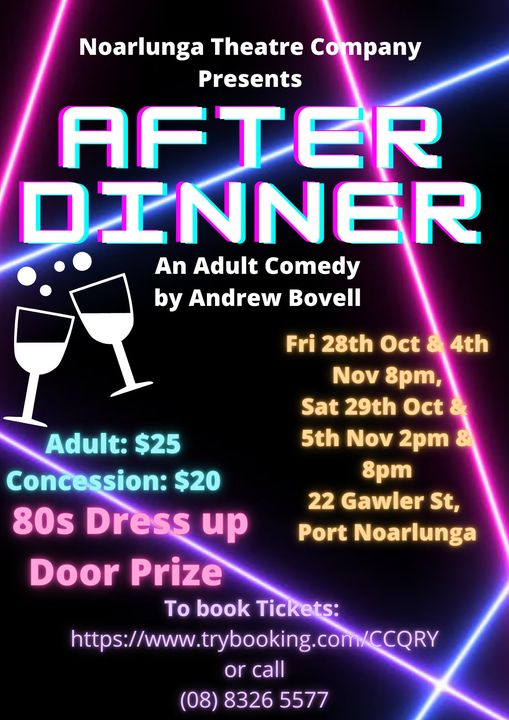At first glance After Dinner by Australian playwright – and Willunga local, no less – Andrew Bovell, is a light comedy. Bovell wrote it in Melbourne in 1984 and following its first staging in 1988, it has been widely performed including a 2018 State Theatre Company season. However, it delves deeper than the superficial, and by means of fast moving and clever dialogue, we see the darker reality underlying the lightness and laughter.
Each character is clearly defined and apart from the dialogue with one another, each gets at least one monologue, usually to explain what it is that’s bothering them.
In this production the Director, Samara Gambling, and her cast of five managed the balance pretty well.
The set was simple, consisting of two tables at the bistro, and some artwork on the rear wall. At the one table in the bistro sat three women, all workmates. At the other were two men, waiting for a friend who never arrived.
Paula, played exuberantly by Tegan Miller, and her friend, Dympie (Kate Saxton) had invited their workmate, Monika (Jaimie Cook) for a Friday night out to cheer her up after the death of her husband. Much of the comedy in that group came from the often pointless bickering between Paula and Dympie. Miller and Saxton carried that off rather well. Saxton’s Dympie was easy to dislike, usually contradicting Paula on petty matters. She did well to bring out the selfishness in the character and made it clear that the arguments had been repeated each week: not catching the waiter’s eye quickly enough, sitting at a table where they couldn’t see the band, and so on. Although funny, the dialogue betrayed a certain sadness at their lot.
Miller, on the other hand, made Paula, for the most part, subservient to her friend and it wasn’t until later that she asserted her independence. That scene was a strong moment in the play.
Jaimie Cook, as Monika, had the difficult job of taking the character through many moods, both comic and tragic, and she did well at that. She made the most of two extended monologues, one where she was deliriously recounting her actions while she had slipped away from the others, and the other, rather affecting scene, where she explained the details of her husband’s death.
The men were, it first appeared, contrasting characters. Paul Pacillo, was the self-effacing Gordon whose wife had recently left him, we assume because of his gormless nature. Pacillo did well to bring us that character and for the most part did so in a natural and convincing way. Nathan Brown, as the if-only-I-could-be playboy, Stephen, brought us a character who was overtly but awkwardly brash, bold and vulgar. That contrasted with his revelation in the second Act that he, too, was tortured by self doubt, principally about his sexual prowess and inability to sustain a relationship. Brown’s role was a challenge in that it tended towards melodrama. Occasionally he strayed into that style.
In the first Act the cast established the characters and style well enough, but it was in the second Act, after dinner, when the play’s purpose and searching themes were underlined. That Act also had more dramatic moments and therefore grew more gripping. The timing in the dialogue and physical focus of the cast improved after the interval, too. The opening night audience was warmly receptive through the entire performance, and readily identified with aspects of all the characters and their predicament.
This was an admirable and challenging choice for the Noarlunga Theatre Company, a genuine and welcoming community theatre group.



